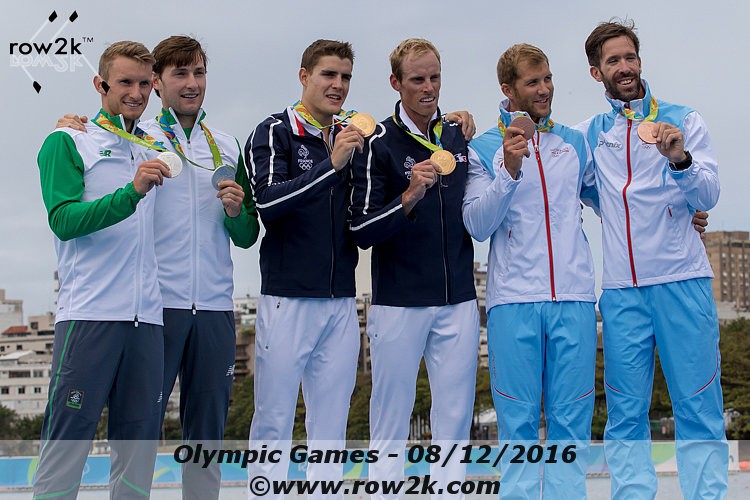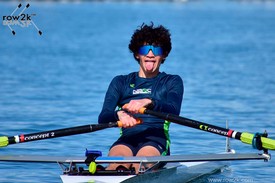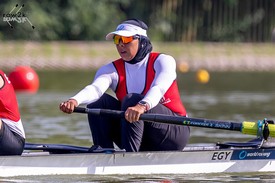Ed Moran, row2k.com

Paul and Gary O'Donovan were fresh from their opening heat at the 2018 Henley Royal Regatta and feeling good about having advanced into the semifinal round in the Double Sculls Challenge Cup as a lightweight crew.
"The competition is going to get tougher tomorrow, and hopefully we can get through, and it will be tougher the day after that," said Gary, who bows the Irish double that won a silver medal in the men's lightweight double at the Rio Olympics.
"(Henley) is one of the biggest events, and we're competing in the heavyweight category as lightweights, so there is an added challenge to take on some bigger, stronger guys - which is a bit of fun that we don't get to do that often."
The O'Donovan brothers made it through semifinal Saturday and then lost in the final racing to Thomas Graeme and Angus Groom, the British national team double from Leander that finished seventh at the 2017 World Rowing Championships. It was a solid showing from a pair of lightweights, racing in an event that does not feature a lightweight division.
For them, Henley was more or less a training trip. The day after the Sunday final, the Irish brothers boarded a plane for Lucerne, Switzerland and World Cup III where they were entered in a field of 18 lightweight crews from around the world. By the end of the next weekend, they had won that regatta.

The Lucerne regatta, like Henley, was a step toward the 2018 World Rowing Championships and eventually the 2020 Tokyo Olympics. If they make it through the next two years, it will be their second Olympics.
But, given the status that lightweight rowing currently holds with the International Olympic Committee, it could be their last, even if they are fit enough and eager enough to take on a third Olympic quadrennial.
The idea that a crew like the O'Donovan brothers would be shut out of the Olympics comes as a shock given the fact that lightweights were added to the Olympic program in 1996 to increase participation in rowing from smaller countries that don't necessarily have the resources or rowing population to field heavyweight crews.
When the O'Donovans reached the podium in Rio, a combination of their success and personality helped drive a national movement that saw some 25,000 school kids sign up for indoor rowing following the Rio Games. The program "Get Going, Get Rowing," existed before the O'Donovan's gained the international rowing spotlight, but their influence helped achieve exactly what lightweight inclusion was meant to do. Rowing Ireland had been in the process of building their federation up, increasing coaching educations and pushing the grass root movement, said Michelle Carpenter, Rowing Ireland's chief executive officer. But she credits the O'Donovan brothers for pushing the progress significantly forward.
"I think the whole rowing movement in Ireland is very strong, and I think the O'Donovan brothers are certainly a key factor," Carpenter said.
But past Rio, without some commitment from the International Olympic Committee to allow rowing to continue to have a lightweight classification, the O'Donovan's time as the faces of Irish rowing will probably end.
FISA managed to survive pressure from the IOC to eliminate the weight category in favor of gender equality in the Olympics following the 2016 Games by voting to eliminate the men's lightweight four in favor of adding a women's four, while keeping the lightweight men's and women's double sculls.

While the vote preserved lightweight sculling as an Olympic event for the Tokyo Games, and achieved the IOC's mandate for gender equality, the 2016 vote may have just saved it for these next Olympics.
According to FISA, the IOC pressure to eliminate, or have rowing justify the need to continue to keeping lightweights, on the Olympic schedule has not ended.
That is a reality is already the subject of conversation among international rowing federations, even two years before the Tokyo Olympics begin.
At the FISA 2018 winter meeting in London, federation representatives were asked to start thinking about what kind of proposals they would like to see on the table for the 2018 FISA Congress following the World Championships in September as it relates to the future of Olympic lightweights.
And it was clear that the argument made in the original push to include lightweights in the Olympics - helping smaller countries without the revenue or available heavyweight athlete pool to develop rowing programs, something then called "universality" - was a dead topic.
The IOC does not favor keeping a lightweight category in rowing, and FISA, and the international rowing community now has to formulate a way to make a compelling argument to maintain even the two lightweight doubles on the Olympic program after 2020, according to FISA Executive Director Matt Smith.
"This is the big question we face currently," Smith told row2k this spring. "We have not succeeded in convincing people outside our sport that there is indeed a strong explanation for the lightweight category at the Olympic Games. We do not hide the fact that the IOC continue to question this category (the two doubles) and ask for strong and convincing arguments."
Smith said that regardless of the pressure from the IOC, FISA said it will continue to seek ideas that could help keep lightweight rowing on the Olympic program.
This is a long way from where FISA's outlook on lightweight rowing was when it was voted onto the 1996 Olympic schedule at the 1993 FISA Congress, having failed one earlier attempt to have lightweights in the 1992 Olympics.
Then, lightweight rowing was going to be the vehicle through which smaller, less developed rowing countries with athlete populations that were smaller both in numbers and physical size could be given an opportunity to compete in rowing at the Olympics, which would be a boost to the overall strength of rowing as an Olympic Sport.
Gaining lightweight acceptance on the Olympic program was still viewed as a win for rowing even as recent as 2014 when then FISA President Denis Oswald called the vote to bring lightweights onto the Olympic program one of his greatest career achievements.
This is the answer Oswald gave to the question of what he saw as his proudest achievement during an interview with World Rowing:
"The development and increase in the number of national federations in rowing and the practice of rowing in different parts of the world. When I started, there were 67 national federations, now there are 142. For me this was my goal from the beginning - the universality of the sport.
"One of the means to achieve this was adding lightweight rowing to the programme of the Olympic Games. This was one of the most difficult tasks that I had. When I visited Asia, especially South East Asia and Latin America and asked them why they did not support rowing, they said 'we have no chance with our smaller, lighter people, so we don't treat rowing as an Olympic sport.'
"I saw lightweight rowing as a way to get more countries involved. But among the IOC (International Olympic Committee) a lot of people were against it because they were not prepared to make an exception for rowing in weight categories.
"There was also opposition within FISA because if lightweight rowing was added to the Olympic programme it would mean we would have to eliminate heavyweight events. At the 1993 Congress I had to convince national federations. I needed a 2/3 majority. I fought hard for that. For example, I studied the average weight of the world population. Lightweights equaled 70 per cent of the world. I was able to convince national federations that our sport could not ignore so many people. I needed 100 votes and I just got it.
"I was proud recently in London at the Olympics when a British coach stopped me and said, 'When you presented your idea about lightweights, I spoke against it. Even after so many years, I'd like to say that I was wrong, you were right. You had a vision and we didn't realize it was for the good of rowing worldwide.'

So, what changed?
The IOC was against having a lightweight category then and it remains opposed today. What has changed is that "universality" as it was used when Oswald was pushing to have lightweights added to the schedule, today refers more to gender equality.
The vote taken to eliminate the men's lightweight four achieved a balance of opportunity between men and women on the Olympic rowing program, but may have eliminated using the argument that having Olympic rowing, would provide opportunities for increased development in smaller countries that was used as the argument for its addition in the first place.
Worse, the addition of lightweight rowing has had the overall effect of diminishing the weight class on the international level at the World Championship level as well. While lightweight rowing enjoys a niche that seems anchored in support and tradition in US collegiate eights rowing, as an international event it has faded.
Look no further than the elimination of the lightweight eight. After enjoying status as a competitive and well-supported boat class at the World Championships for years, the event was eliminated when subscription fell below seven entries for three consecutive years. The lightweight eight had nine entries in 2009, but fell below seven in 2010 and never rose again. It was set to be eliminated after 2012, but was allowed to remain on appeal. The last year the event was contested was 2015.

Last year at the 2017 World Championships, the men's lightweight four fell to six entries. The general belief among rowing federations is that when lightweight rowing was added, federations and athletes focused funding and development on the Olympic weight classes and away from events like the lightweight eight.
"The rowing world evolved and the Olympic world evolved," said Smith. "The budgets for the teams have increased dramatically as has the income and costs of staging the Olympic Games. Rowing has evolved in terms of investment by sports ministries, coaching quality, equipment quality, training subsidies for top athletes, and has attracted increasingly talented athletes.
"The Olympic world evolved and a constant theme heard around Lausanne was why does rowing have a separate competition category where the time difference is only 1 or 2 percent and, mostly, the same countries were winning in open and lightweight categories.
"In essence, it created the perception that the lightweight category was a level playing field for the developing countries but, in particular for the four, to find four world class lightweight rowers was a very difficult challenge. The competition for Olympic quota places among the 28 sports was and continues to be very intense," Smith said.
"Our 124 (Rio) lightweight places are perceived as being unfair by the other sports and cause the IOC difficulty in justifying why rowing has this extra category."
(It is worth noting that while some Olympic events are allowed to qualify for the Games in regional qualification regattas, lightweight were required to qualify at the preceding World Championships.)
Some among the federations at the time of the vote, saw the negative result of adding lightweights to the Olympics coming, including Paul Fuchs, who was then chair of the USRowing Board of Directors and a major proponent for adding lightweights to the Olympics.
"I was concerned about that when the lightweights went into the Olympics - and I was a huge proponent of that, I pushed as hard as anyone on the planet to have that happen," said Fuchs, who rowed internationally as a US lightweight and remains an active member of FISA, serving as Chairman of the Equipment and Technology Committee.
"But I did have the concern right from the beginning that you had the potential that those that were not Olympic events would fall off the radar, which is what's happened."
From his leadership position in USRowing and in FISA, Fuchs has a solid perspective on what happened to the men's lightweight four and why it was eliminated in place of the women's four when the IOC demanded a balance in gender opportunities.
The IOC, which supports only weight classes in the combat sports, does not want to have lightweight rowing, and the current feeling is that any push to keep the lightweight four would have been rejected by the IOC, which would then take the decision on themselves whether to include lightweights.
At the time of the vote to eliminate the lightweight four, several federations, including Australia, Canada, China, Denmark, and Switzerland, pushed for the elimination of the men's heavy weight four, while adding a lightweight women's four and retaining the men's lightweight four.
That proposal never made it to a vote, Fuchs said, because it was widely believed among most the federations that the IOC would not accept the proposal and would use the opportunity to reject lightweight rowing completely.
"Swap the four for the four? The IOC wasn't going to hear it," said Fuchs. "There was a discussion early on about that, but they (the IOC) don't want lightweights period. They don't want a weight class. They don't care at all.
"It was pretty clear that getting out with the double was the best we were going to do," he said. "It was abundantly clear the IOC did not want to keep it. I could have seriously pushed for anything to keep the four, but I just saw that we had the potential to screw ourselves completely by pushing for that."
Now What?
For the remainder of this Olympic cycle, Olympic lightweight rowing exists. After that, the future is unclear.
There is significant support for keeping it on the Olympic schedule from rowing federations worldwide, including the US, Italy, The Netherlands, and Ireland, to name just those reached by row2k.
According to USRowing's CEO, Patrick McNerney, the ultimate US focus will be to retain the two doubles.
"The first point to make is our overall objective is make sure that rowing remains a vibrant part of the Olympic movement," McNerney said. "And with that, we're very focused on the principals of gender equity and also the inclusion of multiple weight classes.
"But there is a tension there because we know we are under a lot of pressure from the IOC in terms of the size of our delegation as we look to the long term," he said. "That tension is going to be how to sustain the gender equity that was achieved in the last go with FISA, but then also with the continued inclusion with the lightweight events that are currently part of the Olympic program.
"We are taking a review of our position; that's a process we are going to go though over the course of this year. I know it will be discussed at the FISA conference in September. FISA introduced it as a topic at the London assembly," he said.
"We've been asked by FISA, as has every other national federation, to respond to the challenge, that challenge being we need to develop an argument as a sport that goes a step beyond universality. The IOC has already said universality is no longer a relative argument. We need to come up with a new position to defend or support the continuation of the lightweight boats classes. I would like to see it stay the same," McNerney said.
Among the federation representatives who responded to questions from row2k, keeping the lightweights past 2020 was a common desire, though some still voice the opinion that the elimination of the lightweight four was a mistake.
"As president of Danish Rowing it's Important for me to underscore that the Danish Rowing position on lightweight rowing is unchanged," wrote Henning Bay in an email. "The position is that lightweight rowing must remain an Olympic event, and seen from the perspective of Danish Rowing, it's the obligation of FISA to fight (so that) lightweight remain on the Olympic program in 2024.
"What has been the consequence of removing lightweight sweep from Olympic program for the international representation in international rowing? The position of Danish Rowing is that it may be time to evaluate openly how to move forward and what can be learned from the decisions made by congress. Funding in elite sport is getting extremely tough - and only Olympic events count. Therefore Danish lightweight sweep is dead!"
Like the Danish federation, Italy also opposed the vote to remove the lightweight four and support the retention of lightweights in the Olympics:
"The removal of the lightweight men's four from the Olympics has caused, in fact, the quasi total lack of top rowers in this boat class during international regattas and many "natural" lightweight athletes aiming at the Olympics trying to become senior athletes," wrote Italy's chief of communication, Claudio Tranquilli.
And in Ireland, where lightweight rowing has been at the center of the sport's growth throughout the country, fueled in large part by the success and popularity of the O'Donovan brothers, the support for lightweight rowing is unquestioned.
"We're very, very disappointed that the four has been scraped from the Olympic calendar of events. We won two world championships last year and they were all lightweights, and it's definitely a priority for us going forwards," said Michelle Carpenter, chief executive officer for Rowing Ireland.
"Obviously, we've done very well in lightweight rowing; we're a smaller nation, so much so that we often don't send our juniors to the junior world championship," she said. "We've had very little participation at the world championship until lightweight rowing was introduced and we would be a massive supporter of lightweight rowing in the Olympics going forward.
"Ideally, we would love to return to the lightweight four, but that doesn't look like it is going to happen," she said. "If that is the case, then we need to look at smaller boats like the single or the pair for men and women," she said. "It needs to be looked at because you have the smaller nations to consider."
No one knows exactly what the future holds for lightweight rowing, but according to Fuchs and Smith, there is talk about creating a new division within the sport that is believed will support lightweight athletes.
According to Fuchs, one of those considerations being discussed is coastal rowing.
"Is there a path forward for lightweights? We started to have this discussion and one of the ideas is coastal rowing. There is no planning, no anything right now, just a discussion of what do we do if they say we will not have weight classes in the future, what kind of events would favor smaller people, whether it's the same race or a different race, and how that would work."
Coastal rowing could be that answer, Fuchs said. "There are a number of people who are not huge, and when you get out there in those conditions, and there is a lot of technical rowing, a lot of challenging conditions, size is no longer the biggest factor.
"We're just trying to think of ways that we can make smaller people more competitive, is there an event we can add, or ways to change the program? Could we have a coastal component, as well as a rowing venue? Who knows. But it is being talked about," he said.
Back to the Future
If there are some within the sport that think the elimination of lightweight rowing will be the end of the boat class entirely, Fuchs is not one of them.
Lightweight rowing will survive internationally, he said.
"I think that there will be a level that will be sustained internationally, there will be enough teams that can fund themselves, which is what lightweight rowing was in the past.
"When I was rowing, we were paying our way, and then we went through a phase where some people were getting paid and the rest of the people were paying their way. I think we're going to back to where everybody is paying their own way.
"On the level of a four and a double and stuff like singles, I think that lightweight rowing will continue in the world championships.
"My opinion is, it's not just going to go away. Not enough countries have eight people that are good enough and can afford to pay the kind of support for an eight, but I think a four, a quad, a double, a single is different. I think you have a chance with those boats of sustaining lightweight rowing."

If you enjoy and rely on row2k, we need your help to be able to keep doing all this. Though row2k sometimes looks like a big, outside-funded operation, it mainly runs on enthusiasm and grit. Help us keep it coming, thank you! Learn more.
Comments | Log in to comment |
- Bont Rowing
- Calm Waters Rowing
- Concept 2
- Craftsbury Sculling
- The Crew Classic
- CrewLAB
- Croker
- Durham Boat Co.
- Empacher
- Faster Masters
- Filippi
- Fluidesign
- h2row.net
- HUDSON
- Live2Row Studios
- Nielsen-Kellerman
- Oak Ridge RA
- Peinert Boat Works
- Pocock Racing Shells
- Race1 USA
- RowKraft
- Rubini Jewelers
- Vespoli USA
- WinTech Racing
- Bont Rowing
- Calm Waters Rowing
- Concept 2
- Craftsbury Sculling
- The Crew Classic
- CrewLAB
- Croker
- Durham Boat Co.
- Empacher
- Faster Masters
- Filippi
- Fluidesign
- h2row.net
- HUDSON
- Live2Row Studios
- Nielsen-Kellerman
- Oak Ridge RA
- Peinert Boat Works
- Pocock Racing Shells
- Race1 USA
- RowKraft
- Rubini Jewelers
- Vespoli USA
- WinTech Racing


















08/02/2018 9:46:38 AM
08/01/2018 10:41:25 PM
08/01/2018 2:37:27 PM
I would like to see the IOC statements calling for these actions, and expressing their position on voting down the voted down suggestion, rather than taking their word for it.
08/01/2018 12:09:52 PM